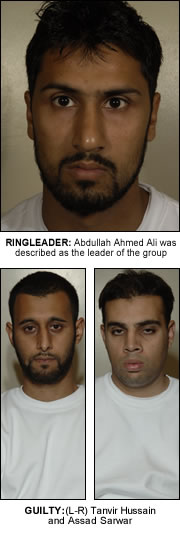Groups aim was for attack to “stand alongside” 9/11, court told
 THREE men who plotted to blow up planes mid-flight between the UK and America and Canada by using liquid explosives were today each jailed for life – with minimum sentences up to 40 years.
THREE men who plotted to blow up planes mid-flight between the UK and America and Canada by using liquid explosives were today each jailed for life – with minimum sentences up to 40 years.
Sentencing Abdullah Ahmed Ali, Assad Sarwar and Tanvir Hussain at Woolwich Crown Court Mr Justice Henriques said the plot would probably have succeeded had it not been for the intervention of the police and security service.
Mr Justice Henriques told Ali he must serve at least 40 years, Assad Sarwar at least 36 years and Tanvir Hussain at least 32 years.
A fourth man – 31-year-old Umar Islam – who was convicted of conspiracy to murder persons unknown – was also jailed for life and ordered to serve at least 22 years.
Mr Justice Henriques said Ali, 28, Sarwar, 29, and 28-year-old Hussain’s aim was a terrorist attack to “stand alongside” 9/11.
The court was told Ali had identified seven flights to the US and Canada – all departing from London’s Heathrow Airport – which were to be attacked in a two-and-a-half hour period.
The group had planned to use ordinary soft drink bottles to hold mixed chemicals which would have been taken on board the planes in hand luggage.
Ali and Hussain used a ‘bomb factory’ in Walthamstow, east London, to plan and create the devices, the court was told.
The men were arrested in August 2006 in a joint pre-planned intelligence led operation by the Metropolitan Police and the Security Service.
During searches of properties connected to the trio officers found dozens of litres of hydrogen peroxide; bulbs and wires; a thermometer; batteries, and a digital tape containing the suicide videos relating to Ali and Hussain.
Mr Justice Henriques described the plot as “the most grave and wicked conspiracy ever proven within this jurisdiction”, and added that it had “reached an advanced stage in its development”.
He added: “I’m satisfied that there is every likelihood that this plot would have succeeded but for the intervention of the police and the security service.
“Had this conspiracy not been interrupted, a massive loss of life would almost certainly have resulted – and if the detonation was over land, the number of victims would have been even greater still.”
The Met operation, codenamed Operation Overt, was one of the biggest investigations in the history of the Metropolitan police.
Deputy Assistant Commissioner John McDowall, head of the Met’s Counter Terrorism Command and Senior National Co-ordinator Counter Terrorism, said: “This has been a lengthy, resource-intensive and meticulous investigation, which has culminated in the convictions and today’s long sentences.
“I cannot thank enough all those involved in bringing these terrorists to justice.”



































